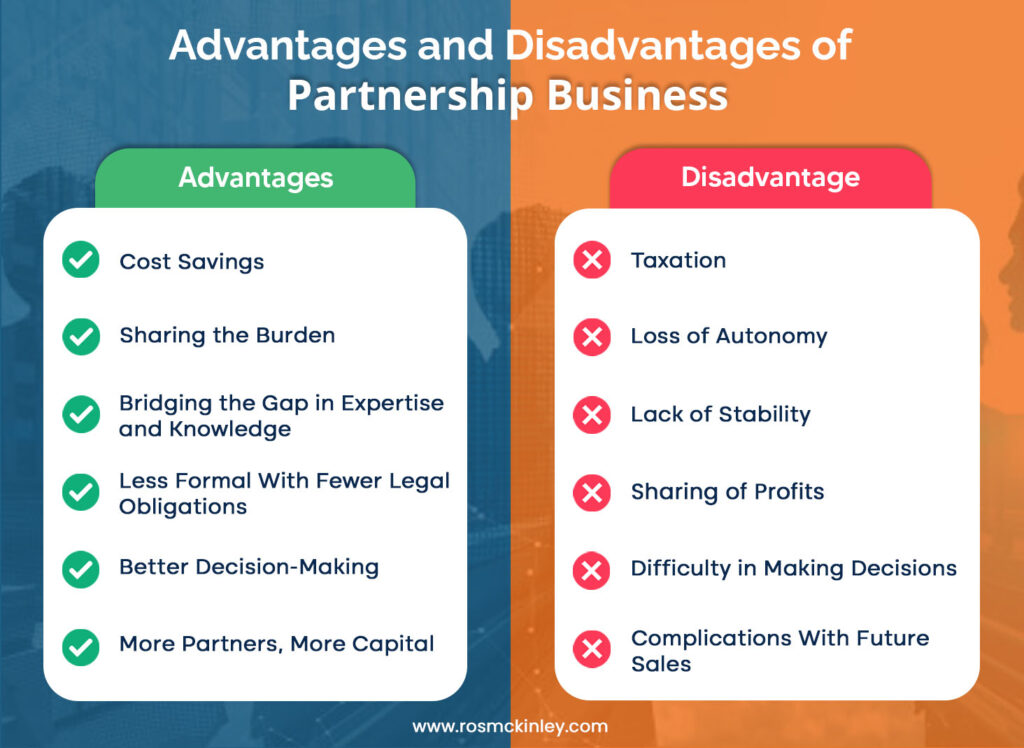
Retained Profit Advantages and Disadvantages
November 13, 2024
Turnover vs Revenue: How Do They Differ?
November 13, 2024Advantages and Disadvantages of a Partnership Business

Everyone starts their business with a plan to stay ahead of the competition and reach new heights. But how can you achieve that? One effective way is by forming a partnership, which allows you to combine resources, expertise, and capital for faster growth.
Partnerships come with some fantastic perks, like sharing responsibilities and having access to more funding. But it’s not all sunshine and rainbows. There are potential downsides, such as conflicts and splitting profits.
So, is this a suitable business model for you? Knowing the pros and cons of partnerships will help you make a well-informed decision, ensuring you choose the best path for your business success. In this blog, we have discussed the advantages and disadvantages of a partnership business so you can make the right decision for your business.

Table of Contents
What Is Meant by a Partnership Business?
A partnership business is a structure in which two or more people share ownership and responsibilities. Each partner contributes through money, skills, or labor while also sharing profits and risks.
Businesses can use this model to combine strengths and grow more efficiently. Clear roles and agreements help prevent misunderstandings when starting a partnership business.
This structure encourages collaboration, making it easier to pool resources and expertise. With the right approach, partnerships can offer a solid foundation for business growth and long-term success.
| Advantages | Disadvantages |
| Cost Savings Bridging the Gap in Expertise and Knowledge More Partners, More Capital Sharing the Burden Less Formal With Fewer Legal Obligations Better Decision-Making | Taxation Loss of Autonomy Lack of Stability Sharing of Profits Difficulty in Making Decisions Complications With Future Sales |
Advantages of a Partnership Business
Forming a partnership offers unique advantages that can impact every area, from finances to work-life balance. Partnership business benefits include shared financial responsibility and a lighter workload, allowing for improved productivity and efficiency.
Partners can benefit from the available resources and each other’s expertise and make better decisions that enhance overall business success.
Here are some advantages of a partnership business:
Cost Savings
In a partnership, you share costs, making it easier for everyone involved. You’re not carrying all the financial weight by yourself, which means you can spend smarter and grow your business faster without feeling the pressure.
Bridging the Gap in Expertise and Knowledge
Partners bring different skills to the table, which is a huge plus. When one partner is strong in one area, the other can help fill the gaps. This mix of knowledge makes solving problems easier and keeps your business adaptable and competitive.
More Partners, More Capital
More partners mean more money to invest in your business. Each partner can contribute funds, making it easier to tackle big projects. This also lowers the need for outside loans, which means less risk.
Sharing the Burden
In a partnership, you’re not doing everything alone. You divide work, bear less load, and won’t burn out. All of your employees and you can stay more productive, and your business runs smoothly.
Less Formal With Fewer Legal Obligations
Partnerships are less formal than sole proprietorships and don’t require a lot of legal paperwork. They’re also easier to start and have fewer rules, letting you focus on growing your business instead of dealing with legal hassles.
Better Decision-Making
Two heads are better than one, and that’s true in business. Partners bring different perspectives, which helps you make smarter, more rounded decisions. Teamwork can help your business tackle challenges and seize new opportunities more effectively.
Disadvantages of a Partnership Business
While partnerships offer some great freedoms, they come with their own set of challenges. One prominent disadvantage is the potential for disagreements between partners, which can lead to tension and disrupt the business. Additionally, if one partner makes a poor decision, it can affect everyone involved. These issues make selecting a trustworthy partner vital for a successful partnership.
Here are some disadvantages of a partnership business:
Taxation
The tax authorities usually tax profits at the individual partner level in a partnership. So, each partner pays taxes on their share of the income. If you and your business partners make a lot of money together, your tax bill can increase quickly. Understanding how taxes work in a partnership business structure is essential for planning.
Loss of Autonomy
In partnerships, you can’t make decisions yourself. You must also consider your partner’s opinion. This can be frustrating if you have a strong vision for your business and your partner might contradict your decision. Having a partner means compromise, which can limit your freedom of being a sole decision-maker.
Lack of Stability
Partnerships can be less stable than other business structures. If one partner decides to leave or faces financial trouble, it can shake things up for everyone. This instability can affect how the business operates and even its long-term success. It’s essential to have a solid partnership agreement to manage potential issues.
Sharing of Profits
You must share profits with your partners, which can feel unfair. Instead of keeping all the earnings, you split them based on your agreement. It can be frustrating, especially if one partner feels they contribute more than others. Sign a contract before starting a partnership business regarding the sharing of profits.
Difficulty in Making Decisions
Decision-making can be challenging in a partnership because everyone has a voice. Sometimes, partners disagree on several issues, which can affect progress. Finding common ground takes time and patience, but it’s important for moving forward. Having a clear decision-making process can help minimize these challenges.
Complications With Future Sales
If you decide to sell your business, things can get tricky in a partnership. You need agreement from all partners, which can complicate the process. Different partners may have different ideas about the sale and its terms. Planning ahead and having clear agreements is important to make future sales easier.
Conclusion
A partnership brings some clear benefits, like shared resources and flexibility. Working with partners can help your business grow faster and run more smoothly.
However, partnerships also have challenges. You’ll need to share profits, and disagreements can happen. If you want more stability and less risk, a limited company or corporation might be better.
Considering the advantages and disadvantages of a partnership business will help you make the best choice for your journey.
